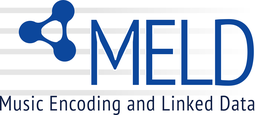Background
A brief history of MELD
MELD continues a rich vein of research into temporal hypermedia, including influences from the pre-web Amsterdam Hypermedia Model and Microcosm, the early web standard for a Synchronized Multimedia Integration Language (SMIL), and more directly experiences from the Hystream and CoAKTinG projects at the University of Southampton. In his doctoral research at Southampton (in the Intelligence, Agents, Multimedia group as-was) Kevin Page considered the use of layered continuous metadata to contextualise temporal multimedia, implemented using Semantic Web technologies. Joining the University of Oxford e-Research Centre in 2010, Kevin began to apply this research to the digital humanities, in particular digital musicology. Across several projects a common approach emerged, realising research data as layers of linked data where, rather than transforming into a single common schema, each layer remains true to its origins of production and use (be that library catalogues, digital editions, performance telemetry, or computational analysis). The key concept of using MEI as a reference layer for music crystallised in Kevin’s paper at the Music Encoding Conference in 2015 - ‘Music encoding in context: MEI and Linked Data’.
The MELD framework as we now know it was created at Oxford through the EPSRC FAST project (2014-2019, led by Mark Sandler at Queen Mary University of London, David De Roure at Oxford, and Steve Benford at the University of Nottingham). Kevin led FAST’s ‘Music Flows’ workthread, for which MELD was a realisation of ‘Digital Music Objects’ (DMOs). David Weigl joined the Oxford e-Research Centre team and, crucially, became the lead developer of the framework, writing the code for what was to become the MELD’s implementation (and, against stiff local competition in acronym authoring, gave MELD its name). The first iteration of the MELD framework was reported in the ISMIR 2017 paper ‘A framework for distributed semantic annotation of musical score: "Take it to the bridge!"’, authored by Kevin and David; while a collaboration with colleagues in Nottingham incorporated an early version of MELD into Climb!, a bespoke interactive high-adrenaline composition (not only because it combined live performance with research software!). Development of MELD in FAST culminated in the 1.0 release in September 2018.
In parallel, the Oxford group explored the use of MELD for digital musicology. David Lewis joined Oxford in late-2016 (peak Davids) as part of the Transforming Musicology project, and went on to work with Kevin on MELD apps: a string quartet annotation tool (more live performance!) and an enhanced British Library article for the Digital Delius project (2017-2018, with Music Faculty colleagues Daniel Grimley and Joanna Bullivant); and via the Unlocking Musicology project (2018-2019) creating apps for the New York Philharmonic Archives (with Barbara Haws) and the Lohengrin TimeMachine (with Laurence Dreyfus, building upon research begun in Transforming Musicology).
David Weigl returned to his native Vienna in 2018, joining the TROMPA project (2018-2021) at the University of Music and Performing Arts (mdw). Here he led the adoption of MELD as part of TROMPA’s data infrastructure, collaborating with Alastair Porter (Universitat Pompeu Fabra) on the creation of a reusable MELD selectable-score component for simplified score annotation and integration with the Solid platform for social Linked Data. Also within TROMPA, David worked with Tim Crawford, Federico Zubani and David Baker (Goldsmiths University of London) on applications for digital musicology scholars, which led to the Music Scholars’ Score Annotator; and with Werner Goebl (mdw) on performance analysis, resulting in the CLARA performance companion app.
MELD continues to play a central role in the digital musicology group at the Oxford e-Research Centre. In the ‘Beethoven in the House’ project, Kevin Page and David Lewis are collaborating with colleagues from the University of Paderborn (Johannes Kepper and Mark Saccomano), the Beethoven Haus Bonn (Christine Siegert and Elisabete Thomé Coelho), and the RISM Digital Centre (Andrew Hankinson) to create a new digital environment combining MELD and the Edirom toolkit.
Driven by the efforts of all these people and projects, MELD reached its v2.0 release in May 2021.


